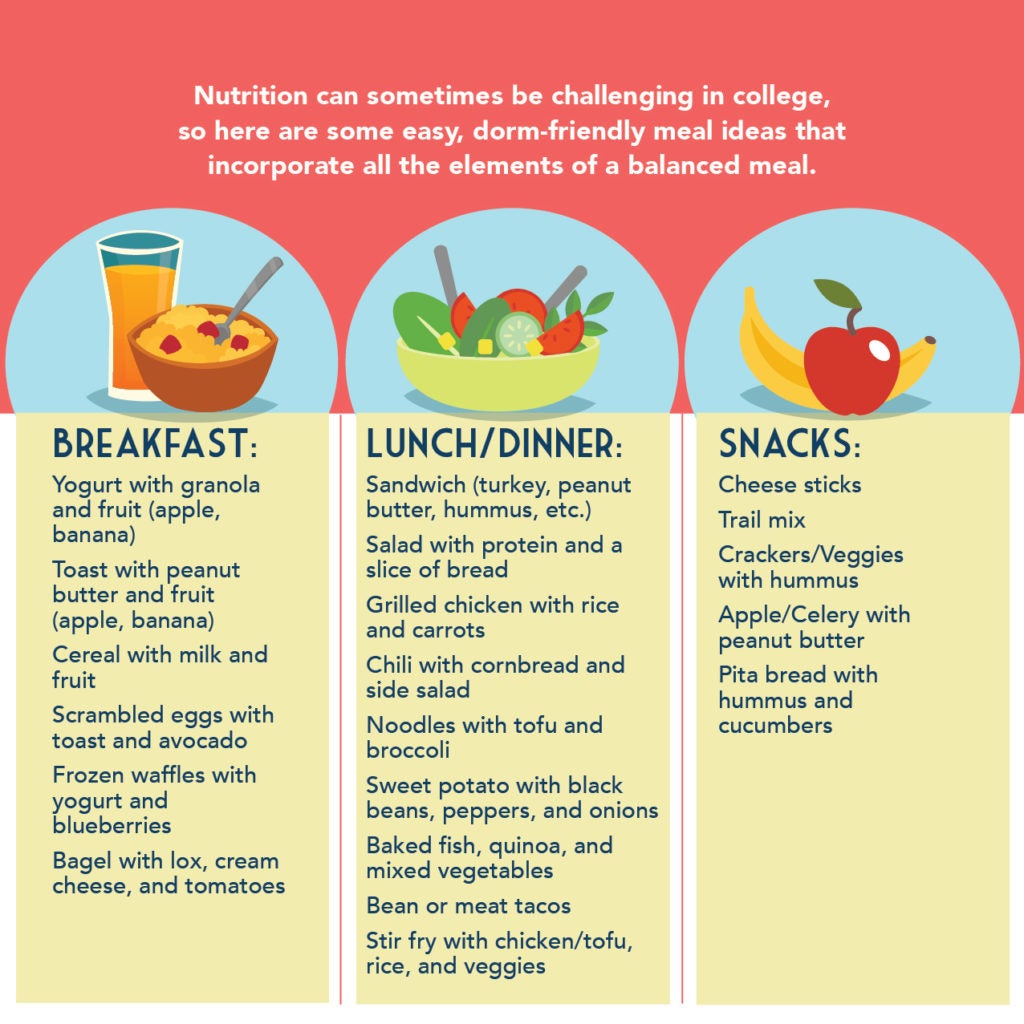Nutrition
Good nutrition is an integral part of staying fueled throughout the day to maintain health and support performance in academics, athletics, and other day-to-day activities. Georgetown and HES provide numerous resources for nutrition consultations and programs for residence halls and student groups.
EMAIL Carol Day at daycr@georgetown.edu to schedule an appointment or a free nutrition consultation.
Yates Field House offers Health & Wellness coaching with one of their certified coaches for a fee. Visit their coaching webpage for more information about pricing and what to expect from a session.
Student athletes have access to nutritional support provided by Taylor Barros, RD, LDN, who works with students to educate on sports performance and promote healthy habits. Visit Georgetown Athletic’s nutrition page for more information about scheduling an appointment.
In general, it’s a good idea to aim for 3 meals per day, each balanced between protein, fats, and carbohydrates. Some days are busier than others, though, and it’s okay if some meals or even some days aren’t perfectly balanced. All foods can fit into a substantial and healthy diet.
Most carbohydrates are easy to recognize, and they provide the body with its main source of energy, as well as make a good foundation for any meal. Some examples include rice, pasta, quinoa, cereal (including oatmeal), bread, tortillas, English muffins, bagels, pancakes, potatoes, sweet potatoes, squash, corn, and peas.
Protein and fat can come together in the same foods (although there are some exceptions — olive oil and avocado are examples of foods with higher fat contents). Protein is important for maintaining the body, including muscles and bones, and fat helps keep us full and satisfied. Some examples include meat (pork, lamb, beef, chicken, turkey), fish/seafood, eggs, dairy (yogurt, milk, cottage cheese, cheese), nuts/seeds/nut butters, beans & legumes, tofu, tempeh, and hummus.
After building a meal with carbohydrates, protein, and some fat, it’s important to consider micronutrients, too — the vitamins and minerals your body needs. These are most often found in fresh produce, both fruits and vegetables. Anything you find on the shelves in the produce section of your grocery store will help provide vitamins, minerals, antioxidants, and fiber, all of which support long-term health.
Harvard University’s Healthy Eating Plate provides further information and guidelines about building a balanced meal to include all of the most important components. They also answer questions about how to apply these guidelines when your meals might not look like a traditional, one-plate sit-down meal.

Body Trust & Intuitive Eating
Body trust is a way of breaking away from and resisting the diet culture that often encourages disordered eating in the first place. Diet culture conflates body shape/size with health, pathologizes some bodies and not others, makes thinness a prerequisite for social advancement, and encourages following external rules about eating and exercise. Body trust is a way of returning to feeling safe and welcome within your own body.
There are nine core elements of practicing a sense of body trust:
- Rediscovering, embodying, and allowing for pleasure.
- Reconnecting with your body’s needs and boundaries.
- Externalizing shame, blame, and bias.
- Looking and listening to yourself with kindness and curiosity.
- Redefining what healing looks and feels like.
- Exploring, naming, and reclaiming, your body and its story.
- Focusing on small, consistent acts to rebuild trust.
- Finding community.
- Rooting self-care practices in weight-neutrality.
All of these elements are an effort to liberate and repair. These elements help heal relationships with food, bodies, and ourselves. Practicing these elements helps to resist and rebel against the prescribed stories and values about body shape and size that do not allow for healing and diversity.
Intuitive eating, or eating intuitively, focuses on trusting your body, listening to your hunger cues, and eating to nourish and meet your body’s needs. Christy Harrison recognizes four crucial components of adopting intuitive eating: self-compassion, self-worth, recognizing the diet mentality, and rejecting the diet mentality.
Intuitive eating can seem scary at first, since letting go of rules, restrictions, and the diet mentality seems like it would lead to gaining weight, and that that weight will negatively impact our overall health. Gaining weight, however, does not automatically “ruin” our health. Research has shown that BMI, for example, does not indicate a person’s health and well-being taken as a single data point; health is more complex that body weight and body fat. Overall, people in all size bodies who pursue body acceptance and intuitive eating, without losing weight, end up with better health outcomes than those who stick to dietary control and restraint.
In general, it’s important to adopt and practice health behaviors for their own sake, rather than for the sake of weight loss, and this is especially important in eating disorder recovery. Professional treatment for eating disorders is often necessary to ensure the health and safety of the person struggling with food and body concerns, but body trust and intuitive eating can be helpful after professional treatment has ended as the person continues to rebuild and strengthen their relationship with food and their body. Both are major components of this aspect of recovery from dieting and disordered eating.
